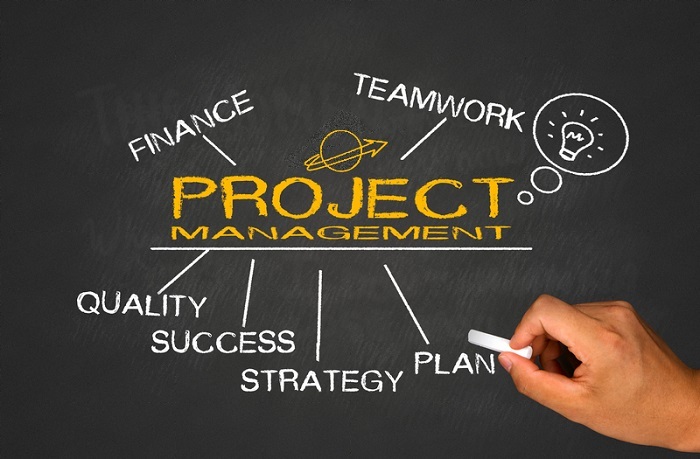
 Data Structure
Data Structure Networking
Networking RDBMS
RDBMS Operating System
Operating System Java
Java MS Excel
MS Excel iOS
iOS HTML
HTML CSS
CSS Android
Android Python
Python C Programming
C Programming C++
C++ C#
C# MongoDB
MongoDB MySQL
MySQL Javascript
Javascript PHP
PHP
- Selected Reading
- UPSC IAS Exams Notes
- Developer's Best Practices
- Questions and Answers
- Effective Resume Writing
- HR Interview Questions
- Computer Glossary
- Who is Who
The Importance of Project Quality Management
Doing excellent work provides great enjoyment. While the definition of "quality" varies from person to person or from customer to client, our objective should always be to deliver high-quality work.
Maintaining quality when it concerns project management is critical for organizations. Making sure you don't make too many errors and keep your project on schedule means constantly producing the right results. Quality is commonly understood, but its use in ordinary life varies from its application in project management.

What is Project Quality Management?
Project quality management is managing and maintaining quality throughout a project. While the context may suggest that "quality" indicates "perfection," it is typically more about establishing quality uniformity across a project in this example. However, what " quality " means depends on what the client or stakeholder requires from the project and so varies from project to project.
Project quality management necessitates project managers constantly measure the quality of the project's activities and procedures. The standards are established to assess outputs, and corrective action must be performed during the project. The ultimate purpose of project quality management is to ensure deliverables that meet the goals and expectations of clients, stakeholders, or customers, depending on the end user.
What are the Phases of Project Quality Management?
Let us first discuss the primary phases of project quality management before delving into its importance. A project's quality management stages include the following ?
Quality Planning
Quality Planning is identifying the quality goals, standards, and procedures that will be followed to guarantee that the project produces a high-quality result. This involves determining the resources, funding, and technologies required to attain the specified quality standards.
A software development project, for example, may begin with a quality planning phase in which the project team specifies the software requirements and establishes quality targets, such as ensuring that the product fulfills accessibility standards and has a high degree of usability. The project team may also develop a quality plan outlining their activities to assure quality, such as undertaking frequent code reviews and user testing.
Quality Assurance
Quality assurance is applying a systematic strategy to evaluate the project's procedures, activities, and outputs to verify that they meet quality requirements.
For example, quality assurance in the same software development project may include using automated testing tools to regularly examine the program for faults and guarantee that it satisfies the set quality requirements. In addition, the project team may undertake frequent code reviews to detect and fix possible quality concerns before they become a problem.
A project manager may also conduct frequent check-ins with the development team to examine the software's quality and identify possible dangers.
Quality Control
Quality control is implementing disciplinary and preventative measures to resolve quality concerns and guarantee that the project meets the target level of quality.
For example, in a software development project, quality control may include employing manual testing and user input to verify the product and guarantee that it satisfies the specifications and quality standards.
The project team may also employ data analysis to identify areas where the program may fall short of quality requirements and then take remedial action to remedy these concerns. This may include resolving concerns, upgrading code, or introducing new features to enhance the software's quality.
Benefits of Project Quality Management
The benefits of project quality management are diverse and may substantially influence project success. Among the many benefits of project quality management are the following ?
Improved project outcomes ? Projects are more likely to accomplish their goals and create a high-quality product using a systematic approach to quality management. This may lead to better project outcomes, such as higher client satisfaction, greater project performance, and lower project costs.
Increased customer satisfaction ? Project quality management ensures that the finished product fulfills the client's demands and expectations. Organizations may boost consumer satisfaction and develop a great reputation for their brand by providing a high-quality product.
Reduced project expenses ? By detecting and resolving quality concerns early in the project, quality management may help to lower project costs. This may assist in avoiding expensive errors and rework, lowering the entire project cost.
Increased Productivity ? Productivity is much more than just working quickly and effectively. It is about developing strong connections among team members and boosting communication and internal procedures. Project quality management covers the output quality and the plans, methods, and progress of a project. This implies that it seeks to enhance all aspects of a project, including its team's productivity.
Improved project team morale ? When quality management is incorporated into the project process, it helps boost project team morale. This is because team members are more likely to feel appreciated and competent in their work, which may lead to increased motivation and job satisfaction.
Why is Project Quality Management Important?
Creates High Standards
Quality planning has always resulted in the finest project outcomes. It establishes how a project should be evaluated and what efforts should be made to improve any company. Project quality management is critical in creating standards that will keep your clients satisfied with your work. A project manager in quality planning is essential since he is responsible for organizing high-quality deliverables and running the project!
Maintains Stakeholder Accountability
The whole project management is a circle in which everyone participates. Everyone is responsible for ensuring the quality of a project, from the benchmarks to all stakeholders. When a project begins, it is heavily reliant on high standards. The stakeholders play a role here.
As a result, project quality management motivates and engages the entire team. Everyone's united work helps to lower the budget and the danger of dissatisfied customers. To minimize unnecessary tension, conduct a quality control check on everything.
Improved Project Planning
Project quality management ensures that the project plan is well-defined and that the resources, budget, and timeline align with the quality objectives. This may increase overall project efficiency and guarantee that the project is finished on time and within budget.
Saves Money
Quality scheduling is very important in project management. When all cost analysis and work are completed, a corporation might cut its stated budget. With the project basics, the PMs may assist the team in progressing and reaching the bottom line.
For example, the quality budget planning for constructing a strong building differs from creating a single-story floor structure. The budget may be overridden by organizing multiple meetings and debating the project quality.
Conclusion
Managing the quality of your project is a difficult task. There are several aspects to consider, team members to supervise and goals to set and track. However, every project manager should always incorporate quality planning as part of the project management process. It is not something that is discovered amid project management. Quality should always be prioritized while executing any strategy since it will help you maintain high standards and achieve your objectives.

